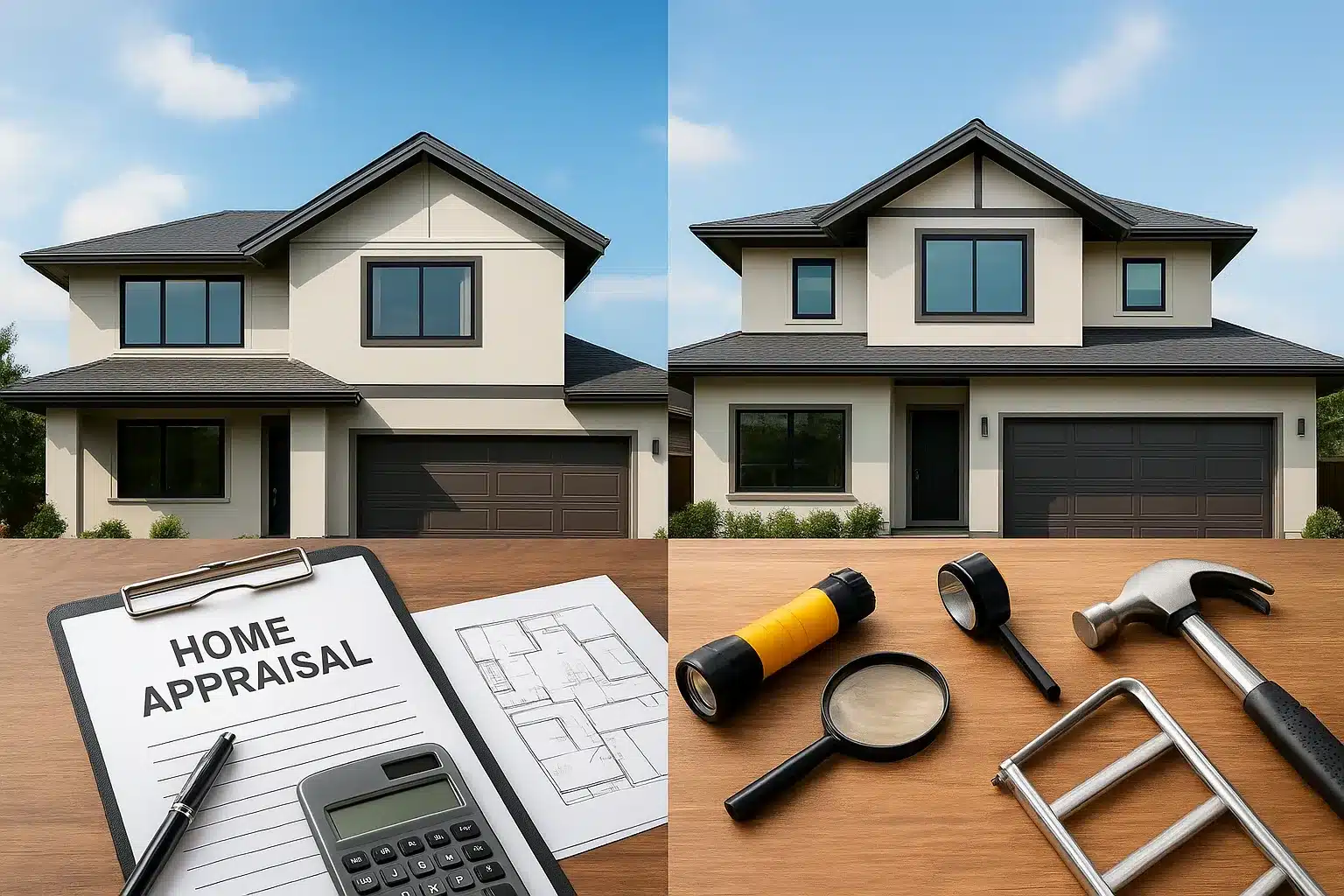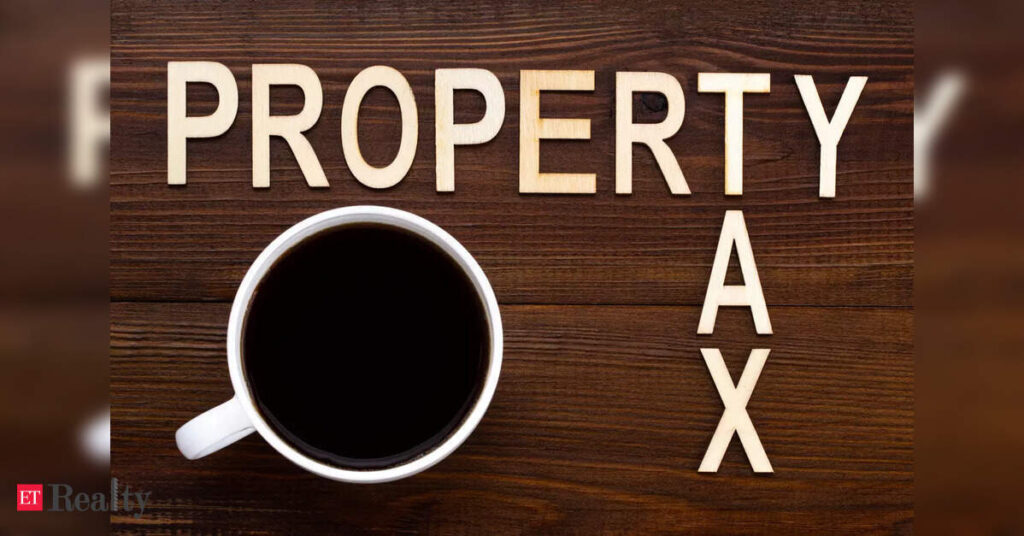A home appraisal vs home inspection often confuses real estate. An appraisal determines the property’s fair market value, usually required by lenders, while an inspection evaluates its physical condition to uncover hidden issues. Both are equally important; appraisal ensures the right price, and inspection ensures safety and quality. Understanding the difference helps buyers, sellers, and investors make smarter property decisions and avoid costly mistakes. [1] [2]
What is a Home Inspection?
A home inspection is a detailed check-up of a property’s structure and systems. Done mainly for buyers, it’s optional but highly recommended. The inspector looks for existing problems, possible future issues, and safety risks, giving buyers a clear picture of the home’s condition before they finalise the deal. [3]
How Does the Home Inspection Work?
Unlike a quick walkthrough, a certified inspector spends hours examining the property in detail. They check everything from foundation to roofing and deliver a report with notes and photos. This report acts as a safeguard, helping buyers avoid hidden surprises and costly repairs after purchase.
Unbeatable Price 5-Star Rated Partner! 2200+ Shades! Top Quality Paint Free Cancellation!

Get a rental agreement with doorstep delivery

Find the BEST deals and get unbelievable DISCOUNTS directly from builders!

5-Star rated painters, premium paints and services at the BEST PRICES!
Key Areas Covered in a Typical Inspection Include:
- Structural Components: The inspector will check the foundation, walls, floors, and ceilings for any signs of cracks, settlement, or structural distress.
- Roof and Attic: The condition of the roof is critical. The inspection will look for damaged or missing shingles, signs of leaks, and proper ventilation in the attic. For a modern approach, some services even offer a drone roof inspection.
- Plumbing System: All taps, showers, toilets, and pipes are checked for leaks, proper drainage, and adequate water pressure. The water heater is also inspected for age and functionality.
- Electrical System: The inspector examines the electrical panel, wiring, outlets, and fixtures to ensure they meet safety standards and can handle the electrical load of a modern household.
- HVAC System: The heating, ventilation, and air conditioning (HVAC) systems are tested to ensure they are in good working order.
- Interior and Exterior: This includes inspecting the condition of windows, doors, paint, and siding, as well as checking for signs of moisture intrusion or pest activity[4].
What is a Home Appraisal?
A home appraisal is a professional, unbiased estimate of a property’s market value. It’s mainly required by lenders, not buyers, to make sure the property is worth the loan amount. This protects the bank if the borrower fails to repay.
How an Appraiser Determines a Property’s Value?
Unlike an inspection, an appraisal focuses on value. An appraiser is a licensed professional who determines a property’s worth based on a combination of factors. This process is an important step in the real estate appraisal services offered by financial institutions.
Key Factors Considered During an Appraisal:
- Comparable Sales (Comps): The appraiser will research recent sales of similar properties in the same neighbourhood. The sale prices of these “comps” provide a strong benchmark for the subject property’s value.
- Property Features: The appraiser will note the property’s key features, such as the total square footage, number of bedrooms and bathrooms, and the size of the plot.
- Condition and Quality: The overall condition of the home, including any recent upgrades or renovations (like a new kitchen or bathroom), will positively impact the value. Conversely, visible disrepair will lower it.
- Location: The desirability of the neighbourhood, proximity to schools, markets, parks, and other amenities plays a significant role in determining the final value.
Key Differences Between Home Appraisal and Home Inspection
To clearly understand the differences between a house appraisal and a home inspection in India, it is helpful to compare them side by side. Each process answers a fundamentally different question about the property.
| Factors | Home Inspection | Home Appraisal |
|---|---|---|
| Purpose | Checks the property’s physical condition & defects. | Determines fair market value. |
| Conducted For | Buyer (peace of mind). | Lender (to protect investment). |
| Required For | Optional, but advised for due diligence. | Mandatory for loan/mortgage. |
| Scope | A detailed, non-invasive check of over 400+ items. | Visual assessment of features & condition. |
| Outcome | Report listing issues & repairs needed. | Report stating appraised value. |
| Impact on Deal | Can trigger renegotiation, repair requests, or cancellation. | Low value may block the loan or require cash difference. |
Do You Need an Appraisal and an Inspection?
Almost every property purchase involving a home loan requires both. The inspection protects you, the buyer, from investing in a property with hidden problems. The appraisal protects the bank from lending more money than the property is worth. Skipping the inspection to save a small amount of money is a significant risk that could ultimately cost you dearly [2].
Which Comes First: Appraisal or Home Inspection?
Typically, the home inspection is the first step in the home-buying process. A smart buyer will make their offer contingent on a satisfactory home inspection. This allows them to conduct the inspection, review the report, and then decide whether to proceed with the purchase, renegotiate the price, or request that the seller make repairs. Only after the buyer is satisfied and decides to move forward will the mortgage lender order the appraisal as part of the formal loan approval process.[3].
Why Property Owners Need Both Services?
The need for appraisal and inspection services is not limited to buyers. Property owners, especially sellers and landlords, can also benefit greatly.
- For Sellers: Conducting a pre-listing inspection can reveal issues that may hinder a potential sale. By identifying and fixing problems beforehand, sellers can present their property with confidence and justify their asking price, leading to a smoother and faster transaction.
- For Landlords: Regular property inspections help landlords understand the condition of the rental unit, ensure tenants are maintaining the property, and identify necessary repairs. This proactive approach to property maintenance helps preserve the property’s value over the long term, which is crucial for a favourable appraisal when it’s time to sell or refinance.
The Role of Property Management Companies
For property owners who do not live locally or lack the time to manage their properties, professional property management companies play a vital role.
- Regular Inspections: These companies conduct periodic inspections of the rental property to check its condition, similar to a mini-home inspection. This ensures that the property is well-maintained by the tenant and that any necessary repairs are identified early. Landlords need to understand the rental tenant inspection rights to conduct these legally.
- Maintenance and Repairs: They coordinate all necessary maintenance and repair work, ensuring the property is always in good shape.
- Preserving Property Value: By ensuring regular upkeep, a property management company helps maintain or even increase the property’s value. A well-maintained property will always receive a better appraisal value and attract high-quality tenants. The role of a property manager is crucial in this regard.
Read More About: Property Inspection
How can NoBroker Help with Property Management Services?
Understanding the nuances between a home appraisal and a home inspection is crucial for informed property ownership. NoBroker offers comprehensive Property Management Services that take the hassle out of being a landlord. Our dedicated team handles everything from finding tenants to rent collection and conducting regular property inspections. By ensuring your property is professionally maintained, we help safeguard its physical condition and preserve its long-term market value.
Frequently Asked Questions
Ans: A home cannot “fail” an inspection; the report simply lists its condition. However, a property can “fail” an appraisal if its appraised value comes in lower than the loan amount requested, potentially jeopardising the mortgage approval.
Ans: The buyer is typically responsible for paying for both the home inspection, which is for their benefit, and the home appraisal, as it is a requirement for their mortgage application.
Ans: A home inspection is more detailed and usually takes 2-4 hours to complete on-site. A home appraisal visit is often shorter, typically lasting 30-60 minutes, with the appraiser completing the research and report later.
Ans: If the appraisal is low, the buyer may need to make a larger down payment to cover the difference, the seller might have to lower the price, or the two parties can negotiate a compromise. Otherwise, the deal may fall through.
Ans: A good inspection report indicates the home is in good condition, which is a positive factor for an appraisal. However, the final appraisal value is heavily dependent on market factors, such as comparable sales in the area.
Recommended Reading

Loved what you read? Share it with others!
ARTICLE SOURCES
- https://timesproperty.com/article/post/home-appraisal-vs-inspection-what-s-the-difference-blid5535
- https://www.bankrate.com/real-estate/home-appraisal-vs-inspection/
- https://www.lendingtree.com/home/mortgage/home-appraisal-vs-home-inspection-whats-the-difference/
- https://propcheck.in/blogs/home-inspection-vs-appraisal-difference/
- https://www.rocketmortgage.com/learn/appraisal-versus-inspection
 kruthi,Author
kruthi,Author
Kruthi is a Chartered Accountant has worked for various Real Estate firms across India, she is well versed with the legal and financial aspects of all real estate transactions. There are numerous documents and plenty of hidden fees that people get lost in, her goal is to shed some light on it all.
Source link




